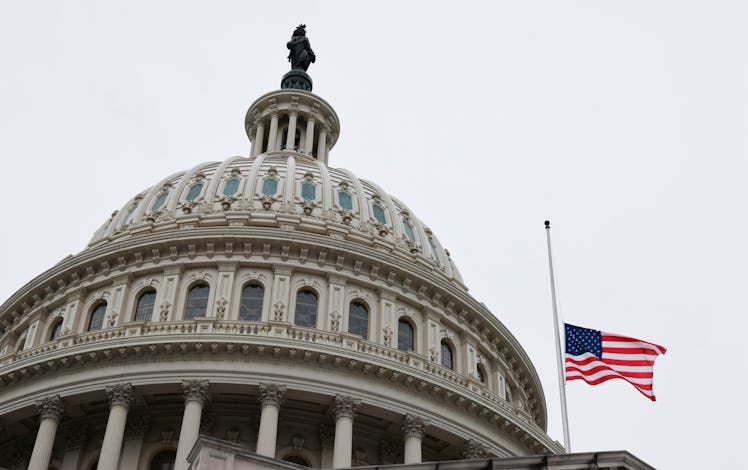
Twitter Is Talking About This Big Issue After Trump Nominated Amy Coney Barrett To SCOTUS
As of Sept. 26, via a live announcement from the White House, Judge Amy Coney Barrett is President Donald Trump’s official Supreme Court nominee. If confirmed, Barrett will take the seat left open by Ruth Bader Ginsburg's Sept. 18 death. With Barrett's nomination, Trump has the opportunity to solidify a conservative majority on the court for a generation — and not everyone is happy about that. These tweets about Trump’s Supreme Court nominee all bring up the one big issue people are worried about.
Across the country, progressives are concerned that Barrett's potential appointment to the Supreme Court could pave the way for a dramatic conservative shift in America’s federal policies, and particularly regarding abortion rights. Barrett, who currently sits on the U.S. 7th Circuit Court of Appeals, has a history of ruling in favor of strict restrictions on abortion as part of what The New York Times called "an almost uniformly conservative voting record." With a conservative justice in place of the liberal Ginsburg, Trump would swing the court to a 6-3 conservative majority, giving conservatives a better chance than ever to overturn the landmark abortion rights case Roe v. Wade, and to shape America’s political landscape for years to come.
Barrett, for her part, promised that she would serve as an impartial judge. "If confirmed," said Barrett during her acceptance speech, "I would discharge the judicial oath, which requires me to administer justice without respect to persons." Still on social media, people are saying that confirming Barrett could lead to a direct attack on reproductive freedoms.
This is Trump's third nomination to the court, following Neil Gorsuch's 2017 nomination to replace Antonin Scalia (after a bitter political fight about whether President Barack Obama would be able to nominate a replacement ahead of the 2016 election), and 2018, when Trump nominated Brett Kavanaugh to replace centrist conservative Justice Anthony Kennedy.
Now, Barrett will need to undergo review and a confirmation vote to be inducted as a member of the highest court in the United States. The Senate Judiciary Committee is responsible for conducting hearings on the nominee, where the potential justice will answer questions and provide personal testimonies to authenticate their nomination. After the hearings, the committee will cast a vote to report the nominee either favorably, unfavorably, or without recommendation. Should Barrett move forward through the process, the full Senate will then cast a formal vote, where the nominee will require a simple majority vote to be officially confirmed as a Supreme Court justice.
Currently, Senate Republicans are the majority party with 53 occupied seats, but two Republican senators — Lisa Murkowski of Alaska and Susan Collins of Maine — have so far said they do not support holding a vote before the 2020 election. In the event of a tie, Vice President Mike Pence is responsible for making the final decision. Per the Associated Press, the Senate is expected to begin holding hearings on Barrett's confirmation on Oct. 12.